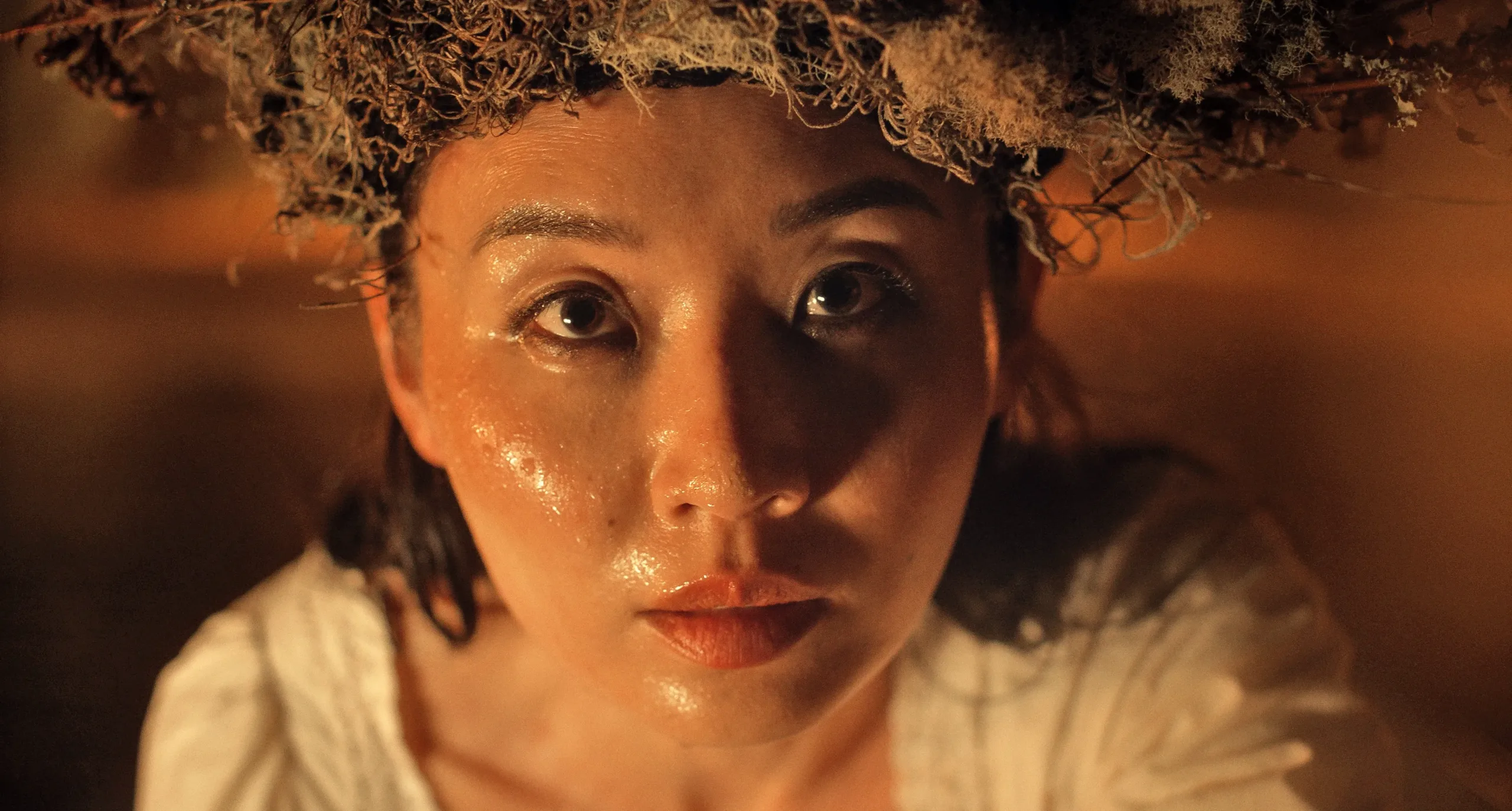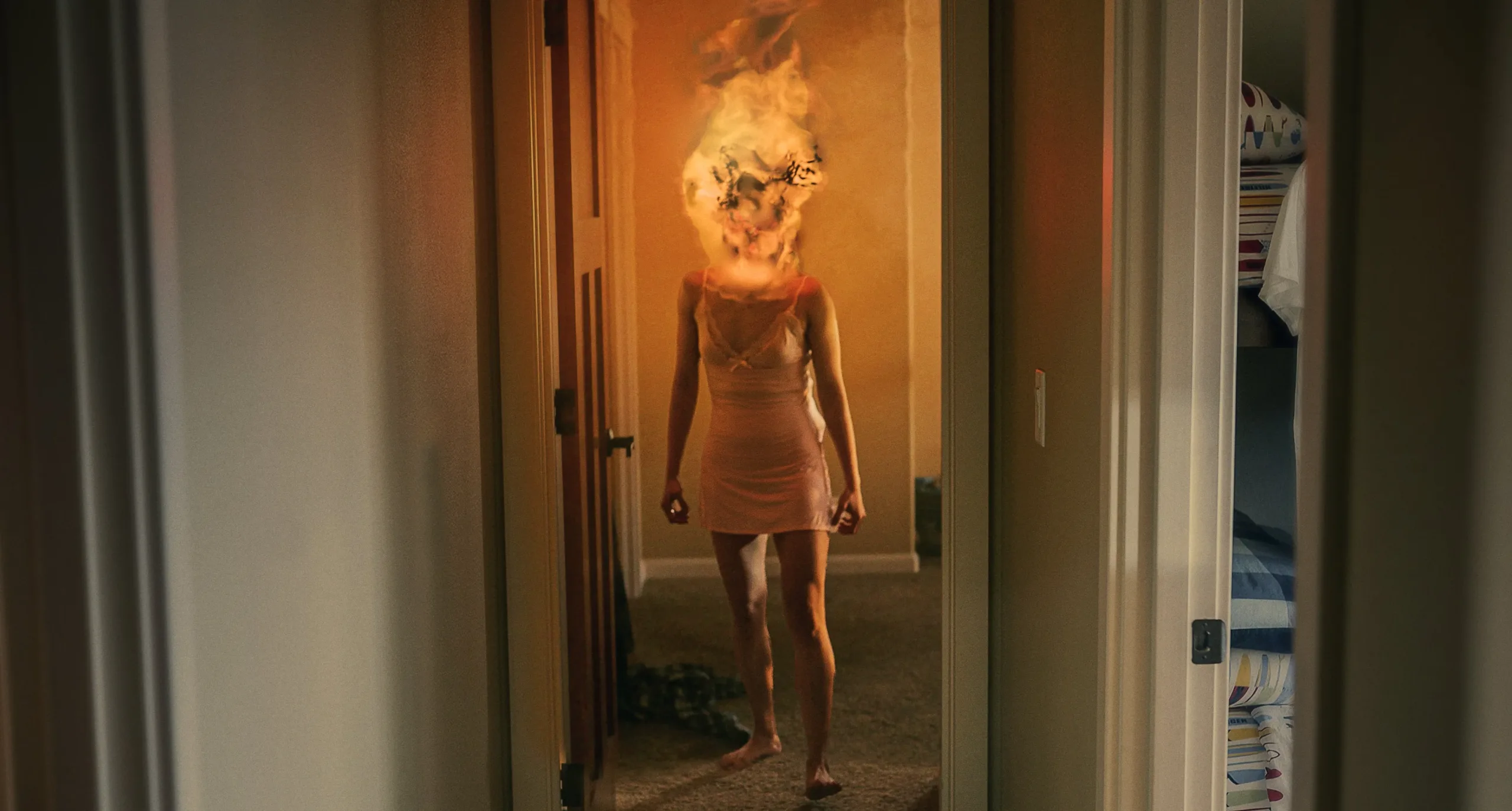Some stories start not with a bang, but with a strange, unsettling stillness. Alma & the Wolf opens on Deputy Ren Accord (Ethan Embry) standing in his hometown of Spiral Creek with a look that suggests he’s already disconnected from his own life.
The atmosphere feels immediately off, like booting up an indie game where the physics are just slightly wrong. The real inciting incident arrives when Ren discovers Alma (Li Jun Li), a bloodied figure from his high school past, cradling her dead dog. Her story is a wild one: a massive wolf, flanked by a herd of goats, mauled her pet.
Coming from someone the town knows has a difficult relationship with alcohol, her plea for justice sounds like a tall tale. The film doesn’t wait to ask for your belief; it simply presents its bizarre premise and asks, “What now?”
Is there a monster in these woods, or is the true threat something buried much deeper within the town and its people? The initial mystery feels like the opening quest of a game like Alan Wake, where the objective is clear but the rules of the world are dangerously obscure.
THE UNRAVELING OF A SMALL-TOWN DEPUTY
Ren Accord is a protagonist built from a lifetime of regrets. He is a man stuck on a loop, forever defined by the high school baseball stardom that injury ripped away. Now divorced, struggling with sobriety, and projecting his own failed ambitions onto his teenage son, Jack, Ren feels less like a hero and more like a character sheet filled with negative stats.
This is where the film finds its anchor. Ethan Embry’s performance is a masterclass in quiet desperation. He carries the weight of Ren’s past in every tired glance and strained interaction. His portrayal of a man losing his grip is the engine that drives the entire narrative, making the psychological decay feel earned and authentic. As Ren begins his half-hearted investigation, his own perceptions start to fray.
He has strange visions and unsettling encounters, blurring the line between the supernatural threat and his own mental collapse. The film effectively uses his fragile state as its primary storytelling mechanic; we see this broken world through his equally broken eyes, never certain if the monsters are real or just pixels glitching in his mind.
A STRANGE BREW OF HORROR AND HUMOR
The first two acts of Alma & the Wolf operate with the chaotic energy of a cult-favorite indie game, something akin to Deadly Premonition. Director Michael Patrick Jann, leveraging a background in comedy, creates a world that is intentionally dissonant. The film swings wildly between a creature feature, a psychological character study, and a pitch-black comedy.
Ren’s visions are surreal and wonderfully strange—an anthropomorphic wolf that looks suspiciously like a man in a suit, eerie goat-like figures in the woods. The low-rent quality of the creature effects feels less like a budget constraint and more like a deliberate stylistic choice, embracing a campy aesthetic that makes the horror feel even more bizarre.
This is punctuated by moments of odd humor, like a recurring gag about the specific felony class for wolf hunting, that keep the audience off-balance. Amidst the chaos is Alma herself. Li Jun Li gives her an enigmatic presence, but the character functions more like a mysterious quest-giver who appears to advance the plot and then vanishes, her potential never fully explored.
A CONFOUNDING CONCLUSION
For all its compelling weirdness, the film makes a critical miscalculation in its final act. It abruptly abandons the ambiguous, dreamlike logic it worked so hard to establish and shifts into a completely serious, explanatory mode.
The tonal whiplash is jarring. It feels like playing a game full of dynamic choices only to be railroaded into a single, hard-coded ending. By resolving the mystery with a tired and conventional storytelling device, the film sacrifices its most valuable asset: its uncertainty. The decision to provide a neat, tidy answer to every question makes the preceding journey feel less significant.
The strange visions and psychological tension are flattened, reduced to simple plot points in service of a reveal that lacks emotional impact. It’s a frustrating narrative choice that undermines the authentic, messy exploration of one man’s collapse. The film presents a fascinating and broken world but ultimately opts for a patch that fixes the bugs at the cost of its soul.
Alma and the Wolf premiered at the Boston Underground Film Festival on March 22 2025 at Cambridge’s Brattle Theatre before reaching U.S. cinemas and major digital retailers (Amazon Video, Apple TV, Vudu) on June 20 2025 under Republic Pictures’ banner.
Full Credits
Director: Michael Patrick Jann
Writers: Abigail Miller
Producers and Executive Producers: Jann Codron, David Codron, Michael Patrick Jann, Eric Binns, David Gendron, Ali Jazayeri, Viviana Zarragoitia
Cast: Ethan Embry, Li Jun Li, Jeremie Harris, Lukas Jann, Kevin Allison, Mather Zickel, Beth Malone, Alexandra Doke, Dana Millican
Director of Photography (Cinematographer): Joe Kessler
Editors: Todd Sandler
Composer: Jherek Bischoff, Craig Wedren
The Review
Alma and the Wolf
Alma & the Wolf builds a fascinating and wonderfully strange world on the back of a tremendous performance from Ethan Embry. Its compelling blend of psychological horror and dark, campy humor creates a memorable experience for two-thirds of its runtime. Unfortunately, the film abandons its ambiguity for a conventional and deflating conclusion, a narrative choice that undermines the very things that made it so interesting. It’s a bold swing that ultimately fouls out in the final inning.
PROS
- A career-best, commanding performance from Ethan Embry.
- A distinct and compelling tone blending dark comedy, psychological horror, and camp.
- An effectively strange and mysterious setup that hooks the viewer.
CONS
- A final-act tonal shift that feels abrupt and unwelcome.
- A conventional plot resolution that weakens the film's unique identity.
- The character of Alma is underdeveloped and underutilized.

















































